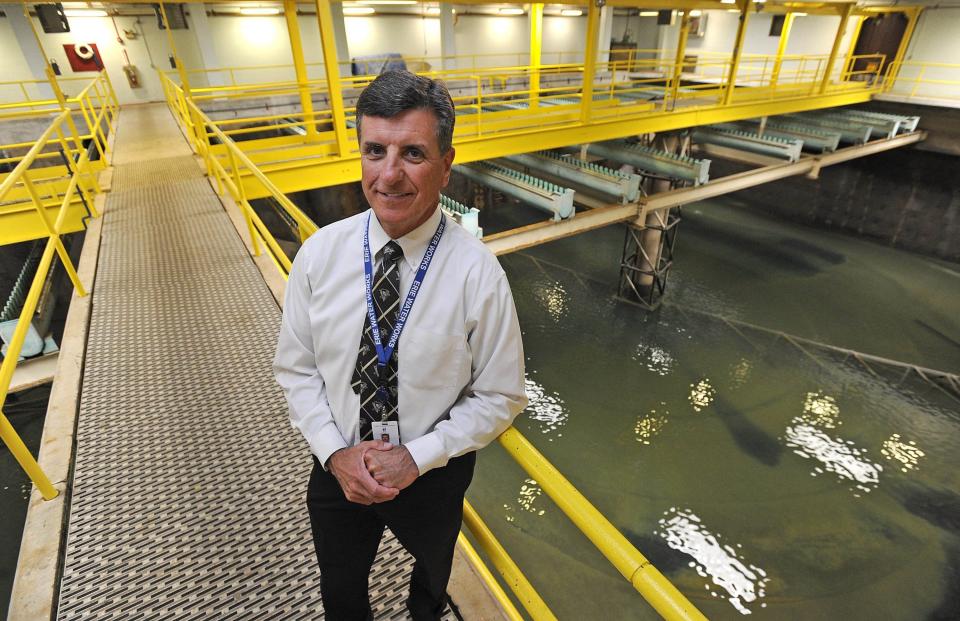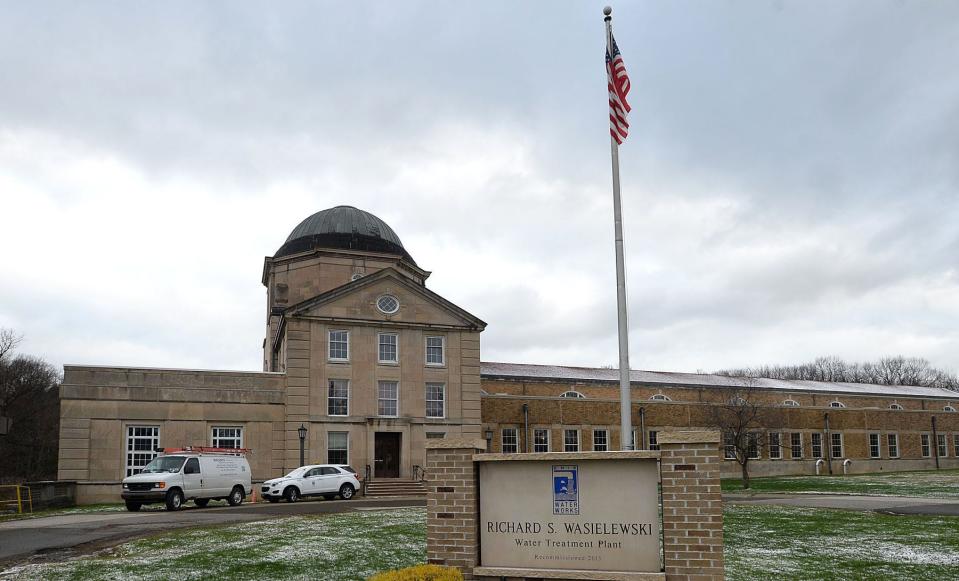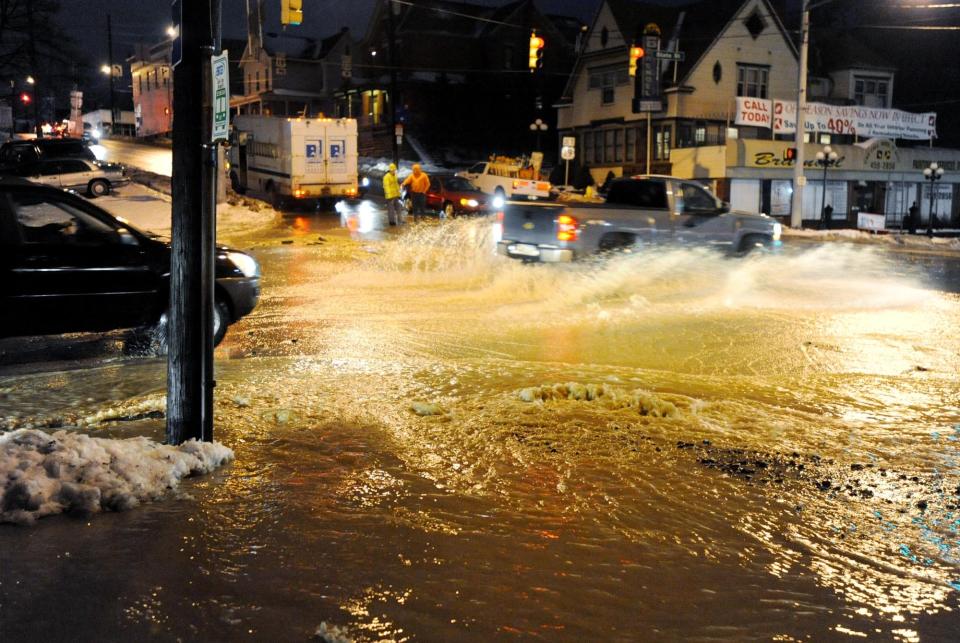Retiring Erie Water Works CEO Paul Vojtek: 'We made the system better for the long run'
Paul Vojtek’s welcome to the big chair was chaotic.
It was Feb. 5, 2003, Vojtek’s first day on the job as the Erie City Water Authority’s new chief executive officer.
That day a 12-inch pressurized pipe ruptured beneath West 26th Street between Peach and State streets, releasing more than 40,000 gallons of water in the area in the 30 minutes before work crews could isolate the break and shut off the water.

The deluge was enough to fill 1,200 standard-size bathtubs and it saturated/destroyed the newly-laid artificial turf at nearby Veterans Stadium.
“I was also in a disciplinary hearing that same day with an employee,” said Vojtek, who had been the authority’s director of finance and administration before his promotion. “That day was baptism by fire for sure."
“But I also realized the importance of a dedicated workforce that day and the depth of what this job entails,” Vojtek said. “I really learned that the buck stops here, at my desk. You can’t run from responsibility.”
Vojtek, 63, is retiring Jan. 6 after a 24-year career with the authority, now known as Erie Water Works.
Calling it a career: Erie Water Works CEO Paul Vojtek to retire in January
Craig Palmer, 48, Erie Water Works’ current senior manager of engineering services, will succeed Vojtek as CEO, Erie Water Works officials have announced.
Vojtek grew up in Munhall, a Pittsburgh suburb, and worked as the accounting and office supervisor at the Municipal Authority of Westmoreland County before moving to Erie in 1999 to begin his career with the Water Works.
After attending the Community College of Allegheny County, Vojtek later earned both a Bachelor’s degree in accounting and a Master’s degree in business administration from Robert Morris University.
During his tenure as CEO, Vojtek oversaw plenty of controversy, change and infrastructure upgrades at Erie Water Works, which has about 63,000 direct residential, commercial, industrial and institutional customers in Erie, Lawrence Park Township, Wesleyville and Millcreek Township, as well as parts of Harborcreek, McKean, Greene and Summit townships.
The local water supply was fluoridated under Vojtek’s watch; the Erie Water Works purchased Millcreek Township’s water system; municipal water service was extended into McKean Township and McKean Borough; and the Water Works finalized a 2020 lease prepayment deal with the city of Erie, which provided the city nearly $97 million to stabilize its finances.
Erie Water Works operates the city’s water system via a long-term lease agreement that runs through 2060.
Erie Water Works has also made more than $350 million in improvements to the local water system since 2003. Prior to that, the aging system had not been routinely upgraded for decades.
Water Works improvement projects include renovation of the Richard S. Wasielewski Water Treatment Plant and the installation of a state-of-the-art water filtration system there, as well as a current project to replace lead pipes and improve the quality of drinking water citywide, which is expected to take several years and cost up to $50 million.
Previous coverage: Erie Water Works receives $6.5 million state grant to replace service connections
The Erie Times-News recently spoke at length with Vojtek about his career overseeing the local water system.
This interview was edited for length and clarity.
Fluoridation controversy
Question: The local controversy over fluoridation was an issue you had to address early in your tenure as CEO. Why did the Water Works feel it was so important to push forward on that despite a lot of public criticism?
Answer: Yeah, at that time there was a lot of that, but to be honest with you the initiation of that effort, the calls to fluoridate the water, came from a group of dental professionals and scientists. The naysayers got a lot of press, but this was initiated by a group of concerned citizens who felt the city of Erie was suffering health issues, especially young children and people living in poverty, because the water was not fluoridated.
Opinion: Erie County can combat inequity with fluoridation but many communities lack it
We had people saying it was rat poison and unsafe but you also had the (U.S. Environmental Protection Agency) and the (Pennsylvania Department of Environmental Protection) saying that water fluoridation was one of the 10 greatest health improvements of the 20th Century. So our board looked at what was presented on both sides and made a decision to fluoridate the water.
Regulators like DEP encourage public water fluoridation. And at that time we looked at places like Buffalo that had been doing it for decades who said there were no problems.

It was controversial and it was testy. There were City Council members against it. But we did it and built the systems to fluoridate.
And I’ve got to tell you this, I talked 10 years later to (a local dentist) who told me he could see the difference that fluoridation made. That to me says it all.
Capital improvements for an aging system
Explain why the $350 million in water system upgrades made during your tenure were necessary and how they have benefitted customers.
When I came to Erie, we had water leaking throughout the system, out of our reservoirs, out of our clear wells, all over. It was leaking so badly we almost couldn’t measure how much water was being lost. For me as the finance guy then, it was a way to cut costs by making capital improvements to quit losing all this water that we had pumped and already treated. That’s kind of what drove me initially. I had about eight years of previous experience down in Pittsburgh, and I came up here and saw what was going on with our water here. Money was literally going down the drain.

And it was because of neglect of the system. I say that firmly, and that might ruffle some feathers. But in my opinion, when the water system was under the city’s administration they didn’t want to upset customers and raise rates. It’s like when you own a house, you might not want to spend the money, but you have to maintain it or the house is going to collapse and fall apart.
Opinion: Fixing Pa. water systems will cost billions, let local governments tap private capital
We had to do absolutely necessary improvements to save money in the long run. New lines, backup power generators, pump station improvements and other things. Lease extensions helped us take advantage of the municipal bond market and get the time to do these improvements. And we made the system better for the long run.
Long term debt: $500 million
The Erie Times-News has reported in-depth on the Erie Water Works’ long-term debt, pointing out in a 2020 investigative piece that your debt exceeds $500 million. How much long-term debt is the utility carrying now, and what is the plan for managing that debt?
We’re probably still around that same number when it comes to debt, $500 million, and that is principal and interest. We’re paying it down and we’ve had minimal borrowing since 2020. We’ve had three credit rating improvements since I started here, we still have an A rating. We have literally saved hundreds of thousands of dollars in bond insurance alone with better debt ratings.
Credit report: Erie Water Works debt exceeds $500 million
At this point we’re in maintenance mode. Our borrowing has slowed down because most of the system has essentially been rebuilt. We do have ongoing projects, and our annual debt service is about $22 million. But right now we are basically paying down debt vs issuing a lot of new debt.
And the efficiencies of the system from the things we’ve put in have led to cost savings as well.
Lease prepayment deal with the city of Erie
The long-term lease deal between Erie Water Works and the city of Erie has been prepaid/extended until 2060. In your opinion why was that deal, which also drew public criticism, a good move for both sides?
If anybody criticized it they didn’t really look at that deal closely. We had a lease that we extended to 2060, which helps if we need to do any potential borrowing for improvements. The city now has a big pot of money, millions of dollars, that is earning significant interest for them. I know they have used some of it, but they still have much of it and it’s earning interest for them.
From 2020: City of Erie officials weigh financial impact of $96.7 million water lease deal
Succession plan
What kinds of conversations have you and your successor, Craig Palmer, had about the path Erie Water Works needs to take moving forward in terms of regionalism, continued system improvements etc.?
Craig has my full support. I was so happy when our board selected him to take over; he’s been sort of my right hand man for 17 or 18 years. He understands the projects we have and he knows exactly what’s needed in the future. He’s a bright guy and will take the system in good directions moving forward.
He will focus I’m sure on projects like the lead line project we have going on and improving the Chestnut Street treatment facility, which is our backup water treatment plant.
More: Erie gives financial assist to citywide lead pipe replacement plan that could cost $50M
Vojtek's final thoughts
What are your retirement plans? And what do you want the public to know most about your time at Erie Water Works?
Initially it’s going to be about just some decompression, because 20 years of being available 24/7 takes a toll on a person. My wife Diane and I are going south this coming winter to North Carolina to spend time with our daughter. My son Paul Jr. is there, he’s a physical therapist down near Myrtle Beach. Our daughter Christina is a physician down in Nashville at Vanderbilt University, so we’ll spend time with her. We’re going to spend time in Florida with some friends from Erie as well.
And I wouldn’t mind helping out the community college here in some way. However I can help to make sure it stays. I spent two years at a community college and I always felt that not having a community college here was an injustice.
As for my time here? I was embraced by the community as a Pittsburgh kid. Now I consider myself an Erieite and I’ve made some dear friends here. I really appreciate this community. I know that sometimes people don’t understand what we do here, and it’s hard to take when you know you’re doing the right thing for people, like fluoridation, and you get criticized. But it’s been a great run for me. And I’m proud of the people I worked with and the job we have done collectively to improve this water system. The water system is a really important part of economic development or growth. Over the last 25 years we have created a system that holds up to any current water quality standards or new ones that might be coming, and one that is ready for any expansion that’s needed down the road. That’s a pretty good feeling.
Contact Kevin Flowers at kflowers@timesnews.com. Follow him on Twitter at @ETNflowers.
This article originally appeared on Erie Times-News: Exit interview: Erie Water Works CEO Paul Vojtek reflects on career

